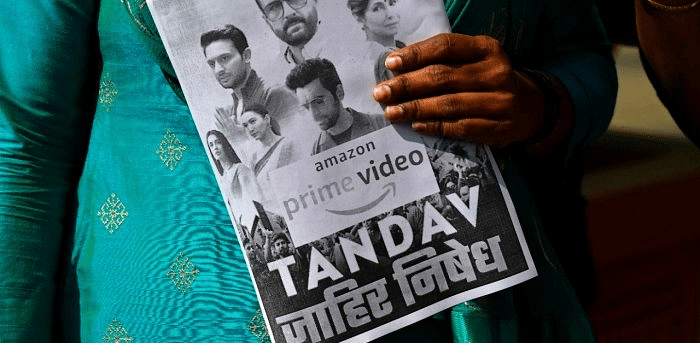
Makers of films and web series for OTT platforms are worried new regulatory guidelines could result in serious curbs on their creativity.
The Information Technology (Guidelines for Intermediaries and Digital Media Ethics Code) Rules of 2021, proposed by the government, aim to bring OTT, social media and online news platforms under a three-tier regulatory framework.
Streaming sites such as Netflix and Amazon Prime will be hesitant to distribute content that is critical of state and army actions, says Gurshabad Grover, senior policy officer, Centre for Internet and Society.
“This may especially affect content creators from Kashmir or North East India,” he observes.
On the other hand, social media intermediaries will be made more accountable to users. “While your grievance will be disposed of in 15 days, there is a higher chance of your content and account getting affected if someone has complained against it,” he explains.
Actor’s perspective
Actor Samyukta Hornad, who has appeared in several Kannada films and web series, says art suffers when it is censored.
“Parental controls already exist on OTT platforms and there is no need for government censorship,” she says. Films create conversations and offer new perspectives. Curbs only result in monolithic opinions, she feels.
Another concern is that fear leads to self-censorship. “People will create content that is not at any risk of backlash. This forces people to move away from what they might truly want to create,” she says.
Comedian Karan Talwar, known for his Instagram meme page @bollywoodgandu, says the regulations are inevitable as OTT and social media have moved from niche to mainstream.
“Indian governments have been banning and censoring things for eons now, so this is nothing new. This will make studio heads even more paranoid and result in the sanitising of content. Expect more Tarak Mehta and less Scared Games,” he says.
Eventually, the rules hurt Indian content creators as audiences will use VPNs and other ways to circumvent blocked sites to watch foreign content without censorship, he adds. Comics are already fed up with people constantly targeting them for their jokes, he says.
More in store?
Columnist Shivasundar, closely associated with Gauri Lankesh Patrike and now with the website Naanu Gauri, believes the guidelines are another step to curbing and criminalise dissent.
While complying with these rules amounts to digging the grave for one’s freedom and creativity, non-compliance invites state action and repression, he says.
These measures could also be part of comprehensive preparations to bring in more anti-people policies without a whisper of dissent, he says.
“The guidelines are draconian, authoritarian and fascist. People should fight them at any cost,” he adds.
Right to Privacy
Last year, the Supreme Court said the right to privacy was a fundamental right and an integral part of the right to life and liberty.
According to the new rules, social media platforms will have to track the ‘originator’ of any post. While this is being touted as a move to fight fake news, privacy experts are sceptical.
Internet Freedom Foundation tweeted, “Due to excessive vagueness in the rules, there is a possibility of over-compliance by social media companies to escape liability. The collateral damage here is citizen free speech and privacy....”
The foundation suspects could push the country down the “slope of automated censorship and surveillance culture.”
Neutral regulation
Akancha Srivastava, founder of Akancha Against Harassment, says while many OTT shows are brilliant, some normalise violence and sexual harassment.
“They glorify the abusive nature of characters towards women and children. How is that okay?” she says.
Freedom of speech is not absolute, which is why, she says, there needs to be a third-party neutral organisation to monitor activity online.
Legal questions remain
Gurshabad Grover of the Centre for Internet and Society says the government may be overreaching with its proposed guidelines.
Section 69A and 79 of the IT Act are only applicable to intermediaries, i.e. services which host or transmit content on behalf of others. OTT services don’t fall in that category; they only host licensed content. They should not be regulated under these provisions of the IT Act, he says.
Questions will be asked about whether the government can regulate OTT and online publishers in this way. “Expect some legal battles in the coming months,” he says.
(With inputs from Sanjana S Megalamane)